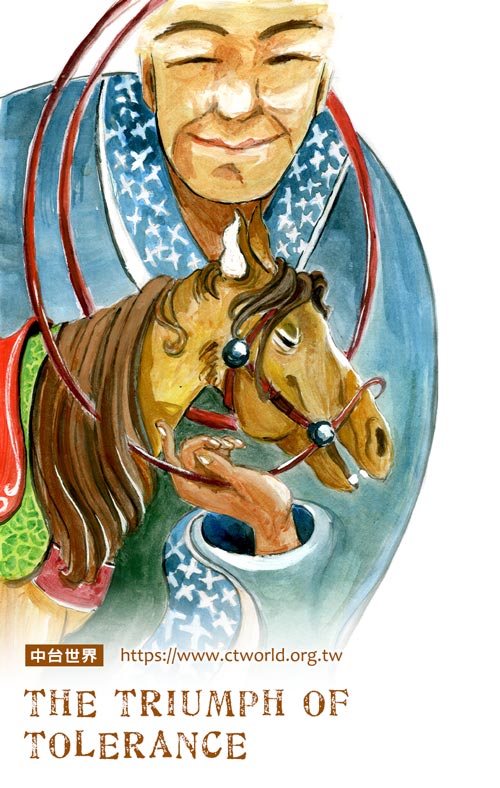
One day, the Buddha was giving a lecture at Jeta Grove in Shravasti. He told the monks of a distant war between the Heavenly God Indra and his host of devas with the asuras. To end the bloodshed, Indra made a proposition to the King of Asuras. “Let us not spill more blood to decide the victor. I propose we hold a debate instead,” he said. The king responded, “Certainly, but who will judge the winner?” “Among the devas and asuras are beings of great wisdom and eloquence. Let them decide who is victorious,” replied Indra.
The King of Asuras began by saying, “You may speak first.” But Indra replied, “I could speak first, but since you were the previous king of heaven, you have precedence over me. Please, you should be the one to begin.”
The King of Asuras said, “A foolish person puts up with insults out of fear, yet believes with pride this makes him superior to the aggressor.” Indra responded, “Though a fool may tolerate insults of our fear, being tolerant will still bring the greatest blessings, as the virtue of tolerance outweighs all the fame and fortune in the world.”
Then, the king said, “Foolish people lack wisdom and must be coerced into doing right. They are like lazy oxen that must be pushed and prodded from behind. Likewise, the best way to control fools is with whips and spurs.” Indra countered, “I believe forbearance is the best way to control the foolish. If one can wait in peace and silence when confronted by an angry person, their anger will die down naturally. A person whose mind is free from hatred or vexation is a sage or the disciple of one. These are the people we should draw close to. A person trouble by anger, who loses their temper easily, will encounter obstacles as great as the mountains. On the other hand, if, like harnessing a wild horse, we can transform our anger when it arises, we will have performed a great deed.”
The devas and asuras judging the debate felt that the King of Asuras based his arguments on the use of violence and force, while Indra advocated overcoming adversity with a mind of tolerance and compassion. As a result, the judges awarded Indra the victory.
The Buddha told the monks, “Indra is the freest in heaven because he practices tolerance and praises its virtues. If you can do likewise, then you will have truly entered the monastic life.” After hearing the Buddha’s teaching, the monks were delighted and vowed to practice and abide in the Dharma.
REFLECTION
The Sutra of the Final Teachings Left by the Buddha says, “Whoever practices tolerance can truly be called a noble person with great strength. Whoever is unable to endure a malicious tongue-lashing like drinking sweet nectar cannot be regarded as a practitioner who has the wisdom of entering the Way.”
All buddhas and bodhisattvas teach and practice tolerance. In daily life, whether we encounter praise or ridicule, slander or honor, gain or loss, suffering or happiness, if we stay patient and unmoved, our minds will naturally be free of hindrances, clear and unmoving.